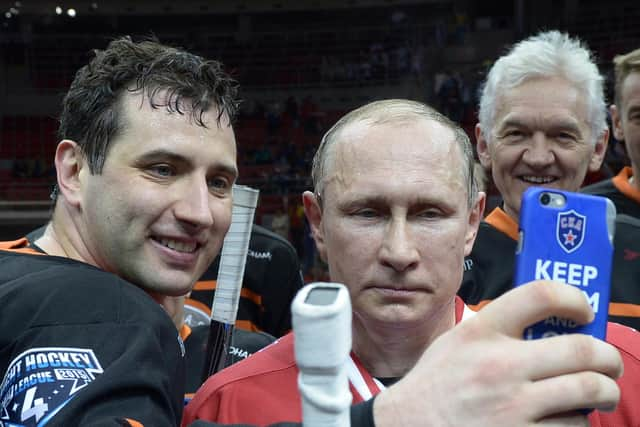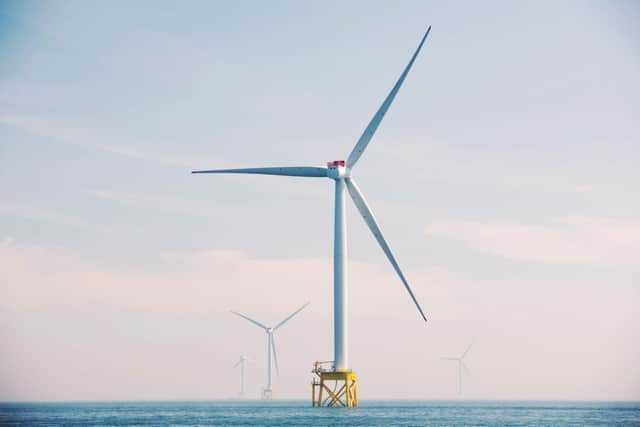Russia-Ukraine crisis: ScotWind firms with ties to Russian state must be given ultimatum – Martyn McLaughlin
Her decision to meet with oil and gas companies in Aberdeen to remind them that Vladimir Putin and his network of cronies should be as isolated as possible was a welcome one.
“Governments have to lead by example in terms of the sanctions that are imposed but big, multinational companies have a big part to play too,” she insisted.
Advertisement
Hide AdAdvertisement
Hide AdThis is undoubtedly true, and it is why Ms Sturgeon’s government and Crown Estate Scotland may wish to revisit some of the successful bidders in last month’s ScotWind auction.
That process, you may remember, saw a host of firms from around the world pay around £700 million to secure the rights to seabed plots for major offshore wind developments around the Scottish coast.
The transformational project has been hailed by Ms Sturgeon as a “massive vote of confidence in Scotland”. It may well be, but Scotland in turn should be asking hard questions of its new suitors.
Several of the companies who proved successful have extensive business ties with the Russian government, its state-owned energy companies, and Putin's allies.
Take TotalEnergies, the French multinational which is part of a ScotWind joint venture with Macquarie’s Green Investment Group and RIDG. It holds a 19.4 per cent stake in Novatek, Russia’s largest producer of liquefied natural gas.


Novatek, though privately held, has close ties to the Kremlin via Gennady Timchenko, a longstanding friend of Putin who sits on the firm’s board of directors. Timchenko, in case you had forgotten, was one of three high profile oligarchs who was targeted by the UK’s sanctions last week.
TotalEnergies has said it will no longer provide capital for new projects in Russia, but it has given no indication that it is prepared to sell its stake in Novatek.
The French firm, Engie, which is part of ScotWind’s Moray offshore renewable power development, is one of five co-financiers of the Nord Stream 2 project by Gazprom, a firm majority owned by the Russian state. Engie has said it is “closely following” the situation in Ukraine.


Advertisement
Hide AdAdvertisement
Hide AdElsewhere, the Japanese conglomerate, Marubeni, which has teamed up with SSE and CIP to develop a major offshore wind farm in the Firth of Forth, announced during the Eastern Economic Forum in Vladivostok last September that it and MOL – a Japanese shipping firm – had signed a memorandum of understanding with the Russian government and other partners for a joint study to build and operate a methanol carrier, used to transport natural gas from the Amur region.
Those other partners include VEB, the Russian state development corporation which is now subject to UK, US, and EU sanctions, and VTB, Russia’s second largest bank, which is unable to do business in the UK or US.
The Russian links go on. DEME, a Belgian firm which is part of a consortium to have been awarded two gigawatts’ worth of option areas in the highly competitive ScotWind leasing process, signed a similar memorandum of understanding last summer with Zarubezhneft, a Russian state-owned oil and gas firm, to develop an offshore wind farm in Vietnam.
Some of the companies which were successful in the ScotWind leasing round have already moved to curb their business with Russia, having come under pressure from politicians and shareholders.
Shell, which secured joint offers with ScottishPower to build and operate two of the world’s first large-scale floating offshore wind farms off Scotland’s waters, has announced it is selling its 27.5 per cent stake in the Sakhalin-2 scheme, operated by the state-owned Gazprom.
The Swedish firm, Vattenfall, meanwhile, said it was “deeply concerned” by the conflict in Ukraine, and announced that no planned deliveries from Russia of nuclear fuel to its nuclear power plants will take place until further notice. It also said that it will not place any new orders from Russia to its nuclear power plants until further notice.
These are not insignificant actions, yet they fall some way short severing ties with Moscow altogether.
Along similar lines, the Danish energy firm, Ørsted, another successful ScotWind bidder, announced that it has stopped sourcing Russian coal and biomass for its power plants.
Advertisement
Hide AdAdvertisement
Hide AdWhich seems like decisive action. At least if you ignore the inconvenient fact that the company will continue to purchase up to two billion cubic metres of natural gas per year from Gazprom as part of a long-term deal which runs until 2030.
These arrangements are complex, and invariably involve Byzantine, legally binding contracts. But as demonstrated by BP’s decision to offload its 19.75 per cent stake in the Russian state-owned oil firm, Rosneft, the fact that some choices are difficult and damaging does not render them impossible.
The various ScotWind consortium partners involved with the above firms should be putting pressure on them to jettison their toxic Russian shareholdings and bring an end to their business deals with Moscow’s industrial apparatus.
But more importantly, the Scottish government and Crown Estate Scotland should make clear that none of them will be allowed to sign a full ScotWind development agreement until they do so.
It is a course of action which exposes the nuances and contradictions in the great renewables push, and it would risk hampering Scotland’s already uncertain journey towards net-zero carbon emissions.
Not only that, but given the great economic expectations surrounding ScotWind, the costs of culling ScotWind’s project partners who refuse to cut their ties to Russia could be considerable. Yet the simple fact is that the costs of doing nothing are immeasurably greater.
As Ms Sturgeon points out, governments and private companies alike have wider obligations in the face of Putin’s imperialist aggression. At a time when firms, investors, and pension funds are unwinding their exposure to Russian state-owned assets, Scotland must take heed of the way the wind is blowing.
A message from the editor:
Thank you for reading this article. We're more reliant on your support than ever as the shift in consumer habits brought about by coronavirus impacts our advertisers. If you haven't already please consider supporting our trusted, fact-checked journalism by taking out a digital subscription.
Comments
Want to join the conversation? Please or to comment on this article.
